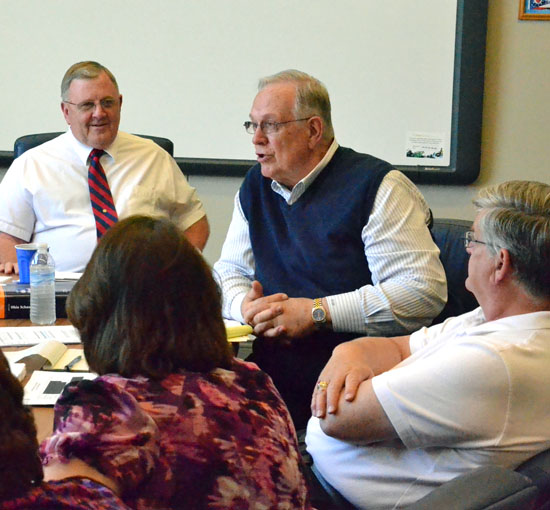C’view discusses tax reduction plan
DAVE MOSIER/independent editor

The Crestview Local Board of Education held a work session Tuesday to discuss something school boards don’t often have the luxury of doing: decreasing district residents’ tax burden.
With additional revenues coming to the district from wind farms and a power plant located in the district, board and Crestview administrators began a cautious process of looking at whether it would be possible to decrease a portion of the district’s taxes.
Superintendent Mike Estes said that, if new revenues come in as expected, he would like to see a reduction of approximately $250,000 in the district’s current tax structure.
The discussion was led by Dick Maxwell, retired executive director of the Buckeye Association of School Administrators (BASA) and an expert on school financing.
Maxwell noted that Crestview currently has an example of just about every funding vehicle available to a school district. Those include a permanent improvement levy, an “emergency” operating levy, a regular operating levy, an income tax levy, and two bond issues.
Most of the discussion revolved around options to not collect revenues from Maxwell called the “misnamed” emergency operating levy, which Maxwell noted isn’t really for emergencies, but basically just a dollar-based levy: one that is created to collect a specific dollar amount, rather than a millage-based levy that fluctuates with district valuations.
Maxwell also talked about the importance of maintaining the “20-mill floor” – a minimum tax base figure established for school districts by House Bill 920 back in 1976. “That’s as low as you can go,” he said, adding that decreasing tax revenues below a district’s 20-mill minimum tax base could result in a loss of state funding.
According to Estes, the board has basically four options:
- Lower the current income tax levy from 1 percent to 0.75 percent
- Renew the tax levy at 1 percent, but not collect revenues from the “emergency” operating levy
- Reduce the amount owed on bonds through the district bond retirement fund
- Do nothing at this time
Maxwell pointed out that reducing the district income tax a quarter of a percent was feasible. He also noted, though, that the action could be permanent, as school boards currently don’t have the power to increase a lowered income tax levy if more revenues are needed in the future.
If renewed at 0.75 percent, Maxwell added, the levy would likely stay at 0.75 percent, meaning the board would have to seek a new levy if additional funding was needed in the future.
Uncertainty over whether new revenues would come in as expected made board members cautious in looking at the various options.
Board member John Auld said he would like to make sure the new revenues do come in at estimated levels before taking any action that could jeopardize district finances in the future.
Estes noted that, with the uncertainties involved in state school funding, he would also like to develop a “rainy day” fund to deal with any future funding problems. “Because we know it won’t last,” the superintendent said of current adequate state funding levels.
Following the discussion, the board reached an apparent consensus to again place the 1-percent income tax levy on the November ballot, but not collect emergency operating levy revenues.
If additional revenues do some in as expected, future plans are to lower the income tax levy a quarter-percent and collect the emergency operating tax revenues.
POSTED: 06/05/13 at 7:16 am. FILED UNDER: News







